Preparing For the CDCES Exam 2020 Free Webinar | September 3, 2020

FREE webinar, September 3, 2020, from 11:30 a.m. – 12:45 p.m. (PST)
Unsure about updates for the 2020 exam?
Coach Beverly offers this FREE webinar to help get you to prepare for the CDCES Exam. All her tips and tricks are meant to ease your mind and reflect the updates to the CDCES content outline.
Topics Covered Include:
- Implications of new certification name, CDCES for our specialty
- Exam requirement updates for 2020
- Exam eligibility and test format
- Strategies to succeed along with a review of study tips and test-taking tactics.
- We will review sample test questions and the reasoning behind choosing the right answers.
- Learn how to focus your time and prepare to take the CDCES Exam. We provide plenty of sample test questions and test-taking tips!
Instructor: Beverly Thomassian RN, MPH, CDCES, BC-ADM is a working educator who has passed her CDCES Exam 6 times. She is a nationally recognized diabetes expert for over 25 years.
See our Preparing for CDCES Resource Page >>
Test Taking Toolkit (220+ practice questions)
Whether you are preparing for the updated CDCES or BC-ADM exam, this test-taking toolkit is designed to prepare you for success.
This toolkit includes two courses with over 220 practice questions to help you prepare and simulate the exam.
- ADA Standards Test Taking Tips
- Preparing for CDCES Practice Exam
Sign up for Diabetes Blog Bytes – we post one daily Blog Byte from Monday to Friday. And of course, Tuesday is our Question of the Week. It’s Informative and FREE! Sign up below!
[yikes-mailchimp form=”1″]Accreditation: Diabetes Education Services is an approved provider by the California Board of Registered Nursing, Provider 12640, and Commission on Dietetic Registration (CDR), Provider DI002. Since these programs are approved by the CDR it satisfies the CE requirements for the CDCES regardless of your profession.*
The use of DES products does not guarantee the successful passage of the CDCES exam. CBDCE does not endorse any preparatory or review materials for the CDCES exam, except for those published by CBDCE.
Disaster Preparedness and Diabetes
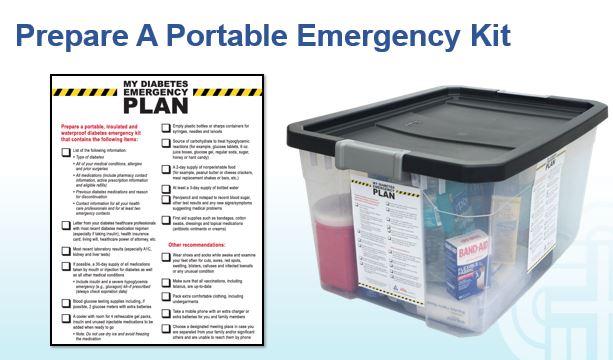
As we enter fire and storm season, it’s always a good idea to think ahead and be prepared for disaster. In addition to the items listed below, make sure to pack hand sanitizer, wipes, and masks due to the current pandemic. Also, bring your own pillow and bedding in case you need to spend time in a shelter.
For any emergency scenario, it’s important to have an emergency preparedness plan. For people living with diabetes, a “diabetes kit” is an important part of emergency preparedness. Diabetes Disaster Response Coalition (DDRC) has put together great resources to help people with diabetes be prepared so that no one is caught unaware without medication.
DDRC’s Diabetes Kit checklist includes needed supplies, but more importantly, information that should be written down and kept in a waterproof container for emergency situations where a health care provider could find it and make informed emergency treatment decisions.
Download, Share and Personalize this Emergency Checklist
Emergency Evacuation-Items to Gather for People with Diabetes
We thought this list was a helpful way to prioritize what items to grab given different time frame limitations. We found it online, and customized it for people with diabetes. It is available in Word or PDF. Thank you for sharing with your colleagues and community.
- Emergency List that you can Customize in a Word Doc
- Emergency List as a PDF to print out
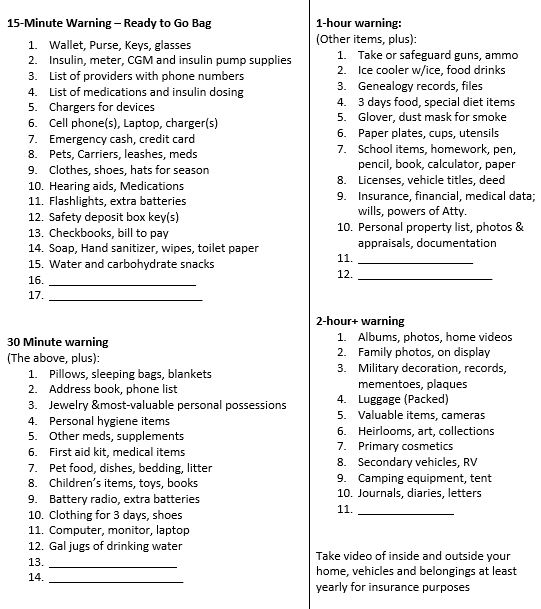
- Emergency List that you can Customize in a Word Doc
- Emergency List as a PDF to print out
1-800-DIABETES (800-342-2383) is an excellent referral resource for people with diabetes to call toll free for updates on accessing medical support during an emergency.
Sign up for Diabetes Blog Bytes – we post one daily Blog Byte from Monday to Friday. And of course, Tuesday is our Question of the Week. It’s Informative and FREE! Sign up below!
[yikes-mailchimp form=”1″]FREE Prep for BC-ADM Exam Webinar | Aug 20
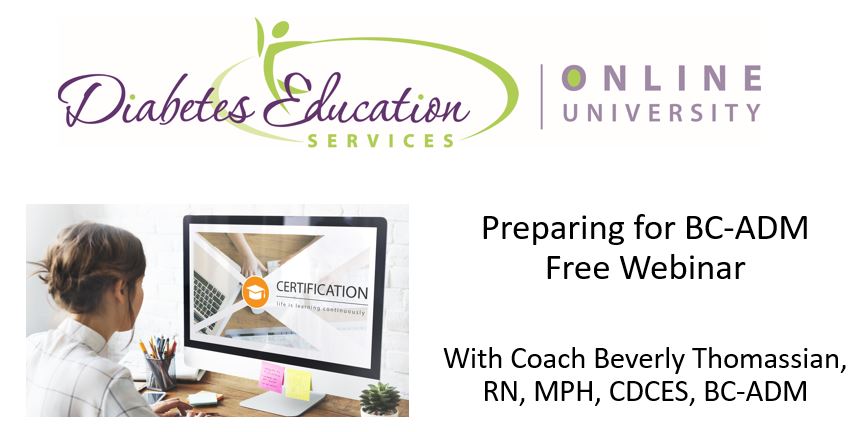
Join us Aug 20, 2020 @ 11:30 – 12:40 p.m. PST
Many of you are curious about the steps involved in becoming a BC-ADM. Thank you for reaching out to us with your questions about eligibility and study strategies. Coach Beverly will be providing answers to your questions interwoven with her own journey to achieve her Board Certification in Advanced Diabetes Management (BC-ADM).
Becoming Board Certified in Advanced Diabetes Management (BC-ADM) is an excellent professional goal for diabetes specialists with an advanced degree in their field and a professional license as an advanced practice nurse, registered dietitian, or registered pharmacist or provider.
The person holding the BC-ADM credential skillfully manages complex patient needs and assists patients with their therapeutic problem-solving. Within their scope of practice, healthcare professionals who hold the BC-ADM certification:
- Adjust medications
- Treat and monitor acute and chronic complications and other comorbidities
- Counsel patients on lifestyle modifications
- Address psychosocial issues
- Participate in research and mentoring
The scope of advanced diabetes practice includes clinical management skills such as medication adjustment, medical nutrition therapy, exercise planning, counseling for behavior management, and psycho-social issues. There is a focus on research, national standards, medical management of diabetes, and co-conditions, with a person-centered care approach.
Preparing for the BC-ADM Exam |
FREE Webinar
Can’t join us live?
Don’t worry, we will send you a link to the recorded version.

This free webinar will review BC-ADM requirements for the current year.
Coach Beverly will discuss:
- exam eligibility and test format,
- strategies to succeed
- study tips and test-taking tactics.
She will also review sample test questions and reasoning behind choosing the right answers. We hope you can join us.
Aug 20, 2020 @ 11:30 – 12:40 p.m. PST
For more information on Preparing for the BC-ADM exam, visit our BC-ADM exam prep resource page.
The use of DES products does not guarantee the successful passage of the CDCES exam. CBDCE does not endorse any preparatory or review materials for the CDCES exam, except for those published by CBDCE.
**To satisfy the requirement for renewal of certification by continuing education for the Certification Board for Diabetes Care & Education (CBDCE), continuing education activities must be applicable to diabetes and approved by a provider on the CBDCE List of Recognized Providers (www.ncbde.org). CBDCE does not approve of continuing education. Diabetes Education Services is accredited/approved by the Commission of Dietetic Registration which is on the list of CBDCE Recognized Providers.”
Sign up for Diabetes Blog Bytes – we post one daily Blog Byte from Monday to Friday. And of course, Tuesday is our Question of the Week. It’s Informative and FREE! Sign up below!
[yikes-mailchimp form=”1″]Insulin Storage and Dispensing Cheat Sheet
How long does glulisine last in pumps? What insulins can people buy without a prescription? What is the longest lasting insulin? If you want to learn the answers to these questions an more, we are here to help!
With the high price of insulin, many people with diabetes are reluctant to throw half-used bottles or pens of insulin away.
With the pandemic and ongoing insulin pricing issues, many people are struggling to pay for their insulin. Armed with information, we can help people maximize their insulin use and optimize their choices.
By knowing how long different insulin formulations last when kept at room temperature (temps up to 86 degrees), we can help people use their insulin as long as it is safe and recommended.
We usually say insulin is good for about 28 days. This is correct for many insulins, but not all.
For example, a vial of Human Regular insulin is good at room temp for 42 days. Degludec (Tresiba) is good for 56 days and Novolin 70/30 vial is good for 42 days. Glulisine (Apidra) expires after 2 days in an insulin pump, but lasts for 28 days in a vial.
See our new and exciting Insulin Storage Cheat Sheet for all kinds of important details on storage and more!
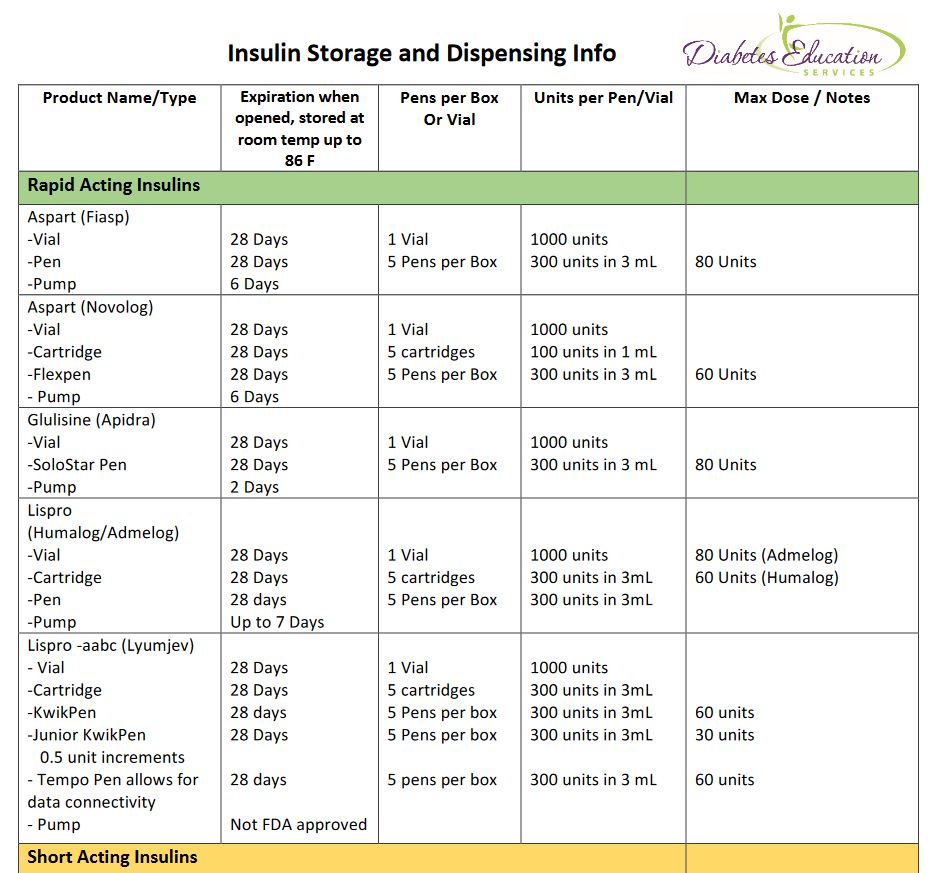
In addition, did you know that there are 3 insulins that do not require a prescription in most states? Regular, NPH and Regular/NPH combo insulins require no prescription.
Regular insulin as a back-up
A recent client ran out of their aspart insulin, was low on cash and out of town. They walked into a local Walmart, without a prescription, and paid $25 cash for a vial of regular insulin. This is incredibly important information to share with clients as a back up in case of emergency.
How many times have you launched into a google search or scoured insulin package inserts to find out the following questions or something like it?
- How long does this insulin last in a pump?
- What is the max dose of insulin this pump will deliver?
- How many pens come in a box and how many units per pen\?
Our Insulin Storage Cheat Sheet answers these questions and more!
Special thanks to Jackson Thomassian for compiling the first drafts of these sheets and to Diana Isaacs, PharmD for her inspiration.
Even though Coach Beverly has reviewed and edited these sheets dozens of times, she knows there is always room for improvement. Please let us know if you see content that needs updating. In appreciation, Beverly
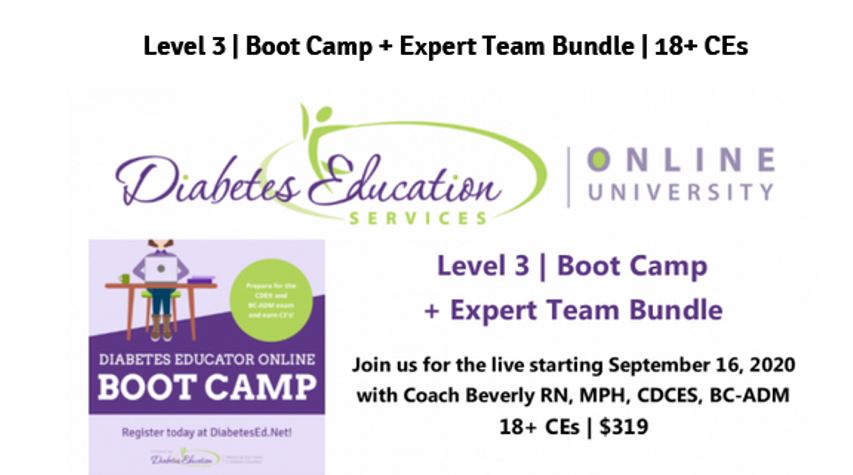
Question of the Week | July 7, 2020

AR is 16 years old and is struggling with weight. AR was diagnosed with type 2 diabetes and has met with the dietitian and diabetes specialist. In spite of eating healthier and a 3% weight loss, AR’s A1c is increasing and is currently 7.6%. The provider decides to start AR on medication.
Which of the following FDA approved medications should the provider prescribe?
- Metformin or SGLT-2 Inhibitor
- Basal insulin or sulfonylurea
- Liraglutide (Victoza) or Metformin
- Basal-bolus insulin
Click here to test your knowledge!
DiabetesEd Top 3 Blog Posts | July 1, 2020
Click here to view our Top 3 Blogs Newsletter

Happy Wednesday Diabetes Community!
We are excited to announce our new feature; Top 3 blog posts of the Month.
Coach Beverly and team are committed to keeping you apprised of the latest findings in diabetes.
We promise to keep this end-of-the-month wrap-up announcement short and sweet while providing links to references so you can dig deeper.
As part of our commitment to sharing information, we are offering FREE webinar viewing of our Level 2 Standards Intensive Series. See upcoming topics and dates below.
Our top 3 blogs this month include the recall of some long-acting metformin brands, Medicare’s $35 monthly cap on insulin starting in 2021, and the rationale for this month’s most popular question of the week.
Happy early July 4th weekend. Please stay safe and take good care.
Coach Beverly
Click here to view our Top 3 Blogs Newsletter
Check out our new bundle!
Level 3 | Boot Camp + Expert Team Bundle
Join us live starting September 16th!
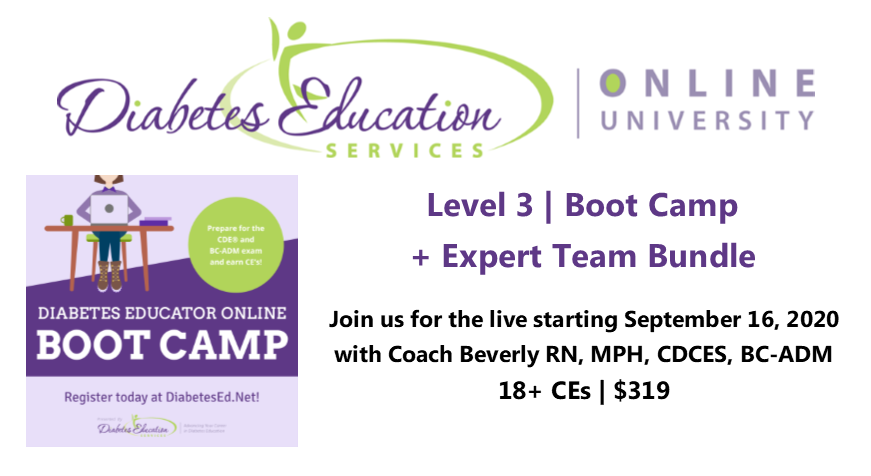
When you join our DiabetesEd Certification Boot Camp, it’s like having your own online coaching staff.
?In each webinar, either Coach Beverly, Dr. Isaacs, or Ms. Armstrong, highlight the critical content of each topic area, so you can focus your study time most efficiently. They also launch multiple poll questions to help participants focus on key concepts and assess their knowledge while learning the best test-taking strategies.
Mastery of this content is critical to ensure certification exam success and to improve clinical outcomes.
Click here to download Level 3 + Expert Bundle flyer
Sign up for Diabetes Blog Bytes – we post one daily Blog Byte from Monday to Friday. And of course, Tuesday is our Question of the Week. It’s Informative and FREE! Sign up below!
[yikes-mailchimp form=”1″]Accreditation: Diabetes Education Services is an approved provider by the California Board of Registered Nursing, Provider 12640, and Commission on Dietetic Registration (CDR), Provider DI002. Since these programs are approved by the CDR it satisfies the CE requirements for the CDCES regardless of your profession.*
The use of DES products does not guarantee the successful passage of the CDCES exam. CBDCE does not endorse any preparatory or review materials for the CDCES exam, except for those published by CBDCE.
Early Adversity and Strategies to Provide Equitable Care
If we consider why certain groups are at increased risk for diabetes, heart attack, stroke, cancers and other health issues, we can look back in time to their childhood for answers.
Children who experience more Adverse Childhood Experiences, also referred to as ACEs, are more likely to suffer with chronic health issues as adults.

Research has show that adverse childhood experiences (ACE) do not affect all children equally.
In the United States, those from marginalized identities are much more likely to have experienced early childhood trauma, which can have lasting effects on one’s health.
The more adverse experiences that happen before the age of 18, the more likely adults are likely to express a wide array of chronic health problems including: diabetes, overweight, cancers, hypertension, stroke, heart attack, mental health issues, substance use, and more.
ACEs are a societal issue.
Due to the complex intersections identity, socioeconomic status, and healthcare access, marginalized individuals are much more impacted by ACE.
This puts certain individuals at higher risk of future chronic conditions in adulthood, like diabetes. These inequities are a by-product of social determinants of health and the impact on individuals and communities. As diabetes advocates, we are compelled to reflect on these intersections to improve health outcomes.

The World Health Organization describes the social determinants of health as “the conditions in which people are born, grow, live, work, and age. These circumstances are shaped by the distribution of money, power, and resources.”
We need to explore and address the social determinants of health to fight for health equity for all people.
This unfair distribution of access and services results in the unfair but avoidable differences in health status seen between different neighborhoods, zip codes, and even states.
Health Equity Defined

Strategies to Improve Health by Strengthening Communities
Achieving equity will take time and is complicated by a long history of institutionalized racism, sexism, and other prejudices. We need to make legislative adjustments that compel corporations, educational systems, health care agencies, and local governments to assure equitable access to services to those who have been historically excluded.
Start with our children. If societies are structured to help children feel safe and protected, they will enter adulthood healthier and more prepared to perpetuate health for future generations. I highly recommend all those involved in diabetes education listen to this groundbreaking video which explores the science between childhood trauma and health: Nadine Burke Harris, MD TED Talk on How Childhood Trauma affects health.
ACE-Aware Training Program: The other obvious place to direct our energy is with our adult clients who are living with prediabetes or diabetes. We know that many of them may be having difficulty making behavior changes and engaging with their health care due to adversity experienced in childhood. Let’s set up or health care facilities to provide Trauma-Informed Care. If you would like to learn more about this topic, I encourage you to get started in this free training worth 2.0 CEs. Becoming ACE-Aware Training Program. I completed this program a few months ago and found it compelling and instructive.
A Practitioner’s Guide to Advancing Health Equity CDC PDF
- The Practitioner’s Guide to Advancing Health Equity can help public health practitioners reduce disparities in chronic diseases. It provides a collection of health equity considerations for policy, systems, and environmental improvement strategies focused on tobacco-free living, healthy food and beverages, and active living.
Thank you for reading this post and we invite you to send us comments or additional resources to [email protected]. We read each email and appreciate your contributions.
Equity and Trauma-Informed Care Resources
COVID-19 & Diabetes: Examining the impact of health disparities in a time of crisis(link is external) – This live event, posted on the ADA website, was recorded Thursday, April 23. It provides an excellent exploration of health equality vs. health equity with honest and insightful discussions by a panel of experts. As the nation grapples with the COVID 19 health crisis, communities already experiencing social, economic, and health disparities face even more severe challenges combatting this disease. Join us for an information-packed webinar exploring the nexus of COVID-19, diabetes, and health equity.
Daniel E. Dawes, JD, Author, The Political Determinants of Health, and Director, Satcher Health Leadership Institute at Morehouse School of Medicine.
Adverse Childhood Experiences (ACE) Resources
Nadine Burke Harris, MD TED Talk on How Childhood Trauma affects health
Becoming ACE-Aware Training Program
ACE Screening Tool and Resilience Inventory
Posted on www.AcesAware.org A Health Problem and An Opportunity: Screening for Adverse Childhood Experiences
Dr. Dayna Long, Director for the Center for Child and Community Health at UCSF Benioff Children’s Hospital Oakland, discusses the pervasiveness of Adverse Childhood Experiences (ACEs) and why screening for ACEs is critical to providing trauma-informed care.
NPR Article – Take the ACE Score and Learn what it does and doesn’t mean
Trauma-Informed Care Fact Sheet
Sign up for Diabetes Blog Bytes – we post one daily Blog Byte from Monday to Friday. And of course, Tuesday is our Question of the Week. It’s Informative and FREE! Sign up below!
[yikes-mailchimp form=”1″]Accreditation: Diabetes Education Services is an approved provider by the California Board of Registered Nursing, Provider 12640, and Commission on Dietetic Registration (CDR), Provider DI002. Since these programs are approved by the CDR it satisfies the CE requirements for the CDCES regardless of your profession.*
The use of DES products does not guarantee the successful passage of the CDCES exam. CBDCE does not endorse any preparatory or review materials for the CDCES exam, except for those published by CBDCE.
Diabetes Intensive Webinar Series | Starts June 23
We are excited to invite you to our upcoming webinar series. Coach Beverly is offering FREE access to our Level 2 | Standards of Care Intensive Series Live Stream Webinars.
This intensive series is designed to engage students in deciphering and exploring the ADA Standards of Care from top to bottom.

Mastery of the ADA Standards content is critical to ensure certification exam success and to improve clinical outcomes.
Our first course of the Level 2 Series, Microvascular Complications – Preventing Eye Kidney and Nerve Disease, is recorded and ready for viewing. You can watch for FREE or purchase to earn CEs. See information below.
Live Stream Webinar Dates
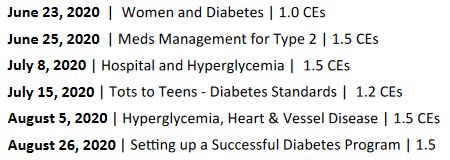
Join Options to view Live Stream Level 2 Webinars
- Watch for Free (no CEs): Coach Beverly wants to increase access and opportunities for the DiabetesEd Community to benefit from the valuable information offered in these courses. This option is available for those who want to join the course(s), but don’t need CEs. Click here.
- Earn CEs | Purchase Courses – This option includes the video presentation, podcast, practice test, and additional resources. To register for some or all of our Level 2 Courses, click here.
Microvascular Complications Intensive 2020 | Ready for Viewing
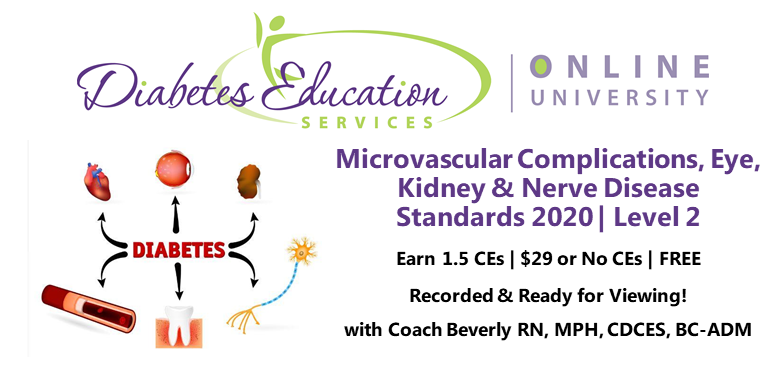
DiabetesEd Services Online University Courses are an excellent way to study for your exam anytime and anywhere that is convenient. You have immediate access to your courses for 1 year after your purchase date.
This 90-minute course provides you with the need-to-know information regarding the microvascular complications of diabetes. We start with a brief overview of the pathophysiology and clinical manifestations then sum up with prevention strategies and screening guidelines.
Topics include:
- Eye, kidney and nerve disease
- Modifiable and non-modifiable risk factors for diabetes complications
- Screening guidelines and prevention strategies.
Click here for FREE recorded webinar (no CEs).
Sign up for Diabetes Blog Bytes – we post one daily Blog Byte from Monday to Friday. And of course, Tuesday is our Question of the Week. It’s Informative and FREE! Sign up below!
[yikes-mailchimp form=”1″]Accreditation: Diabetes Education Services is an approved provider by the California Board of Registered Nursing, Provider 12640, and Commission on Dietetic Registration (CDR), Provider DI002. Since these programs are approved by the CDR it satisfies the CE requirements for the CDCES regardless of your profession.*
The use of DES products does not guarantee the successful passage of the CDCES exam. CBDCE does not endorse any preparatory or review materials for the CDCES exam, except for those published by CBDCE.








